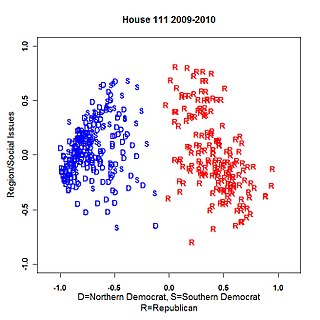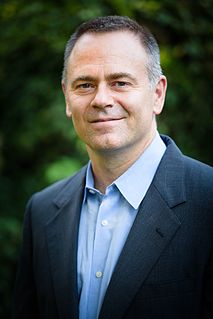Matthew S. Levendusky (born c. 1979) is an American political scientist, best known for his 2009 book The Partisan Sort: How Liberals Became Democrats and Conservatives Became Republicans. His work has primarily focused on explaining political polarization, but also includes media analyses and topics related to public opinion and American foreign policy. Levendusky is currently associate professor of political science at the University of Pennsylvania.
Levendusky was raised in Pittsburgh, Pennsylvania, later attending Pennsylvania State University, where he graduated with a degree in political science in 2001. After graduating, he entered the political science PhD program at Stanford University. He was a runner-up for a National Science Foundation grant to attend Stanford, where he obtained a Ph.D. in political science. [1] After completing his dissertation in 2006, Levendusky spent a year as a postdoctoral research associate at Yale University in the Center for the Study of American Politics in the Institution for Social and Policy Studies. Levendusky began working at the University of Pennsylvania as an assistant professor in the political science department in 2007.
The Partisan Sort: How Liberals Became Democrats and Conservatives Became Republicans, is a book on the phenomenon of growing political polarization in the United States. [2] [3] [4] Levendusky finds that while a small number have become more extreme over time, most contemporary Americans maintain relatively similar views to those in previous generations. What has changed is the way people sort themselves into parties. Previously, many liberals identified as Republicans and many conservatives identified as Democrats. More recently, the parties have become more ideologically pure and encouraged people to think of themselves in that way as well. Thus, voters have been "sorting" into Democrats and Republicans and eliminated much of the middle ground that existed in previous generations.

The Republican Party, also referred to as the GOP, is one of the two major contemporary political parties in the United States, along with its main historic rival, the Democratic Party.

The Federalist Society for Law and Public Policy Studies, most frequently called the Federalist Society, is an organization of conservatives and libertarians that advocates for a textualist and originalist interpretation of the United States Constitution. It features a student division, a lawyers division, and a faculty division. The society currently has chapters at more than 200 United States law schools. The lawyers division comprises more than 70,000 practicing attorneys in ninety cities. The society is headquartered in Washington, D.C. Through speaking events, lectures, and other activities, it provides a forum for legal experts of opposing views to interact with members of the legal profession, the judiciary, and the legal academy. It is one of the United States' most influential legal organizations.

A culture war is a cultural conflict between social groups and the struggle for dominance of their values, beliefs, and practices. It commonly refers to topics on which there is general societal disagreement and polarization in societal values.
American electoral politics has been dominated by two major political parties since shortly after the founding of the republic. Since the 1850s, they have been the Democratic Party and the Republican Party. Since the last major party realignment in the mid-20th century, the Democratic Party has been the center-left and liberal party, and the Republican Party has been the center-right and conservative party. Since the 1990s, both the Republican and Democratic parties have shifted further apart. This two-party system is based on laws, party rules and custom, not specifically outlined in the US Constitution. Several third parties also operate in the U.S., and from time to time elect someone to local office. The largest third party since the 1980s has been the Libertarian Party. Besides the Constitution, Green, and Libertarian parties, there are many other political parties that receive only minimal support and only appear on the ballot in one or a few states.
Philip Ernest Converse was an American political scientist. He was a professor in political science and sociology at the University of Michigan who was a seminal figure in the field of public opinion, survey research, and quantitative social science. He has been described as "one of the most important social scientists of the 20th century."

In American politics, the Southern strategy was a Republican Party electoral strategy to increase political support among white voters in the South by appealing to racism against African Americans. As the civil rights movement and dismantling of Jim Crow laws in the 1950s and 1960s visibly deepened existing racial tensions in much of the Southern United States, Republican politicians such as presidential candidate Richard Nixon and Senator Barry Goldwater developed strategies that successfully contributed to the political realignment of many white, conservative voters in the South who had traditionally supported the Democratic Party rather than the Republican Party. It also helped to push the Republican Party much more to the right.
Political polarization is the divergence of political attitudes to ideological extremes. Almost all discussions of polarization in political science consider polarization in the context of political parties and democratic systems of government. In most two-party systems, political polarization embodies the tension of its binary political ideologies and partisan identities.

The 1994 United States House of Representatives elections were held on November 8, 1994, in the middle of President Bill Clinton's first term. As a result of a 54-seat swing in membership from the Democratic Party to the Republican Party, Republicans gained a majority of seats in the United States House of Representatives for the first time since 1952. It was also the largest seat gain for the party since 1946, and the largest for either party since 1948, and characterized a political realignment in American politics.
An independent voter, often also called an unaffiliated voter in the United States, is a voter who does not align themselves with a political party. An independent is variously defined as a voter who votes for candidates on issues rather than on the basis of a political ideology or partisanship; a voter who does not have long-standing loyalty to, or identification with, a political party; a voter who does not usually vote for the same political party from election to election; or a voter who self-describes as an independent.
Media bias in the United States occurs when US media outlets skew information, such as reporting news in a way that conflicts with standards of professional journalism or promoting a political agenda through entertainment media. There is liberal bias and conservative bias. Claims of outlets, writers, and stories exhibiting both have increased as the two-party system has become more polarized. There is also bias in reporting to favor the corporate owners, and mainstream bias, a tendency of the media to focus on certain "hot" stories and ignore news of more substance. A variety of watchdog groups attempt to combat bias by fact-checking biased reporting and unfounded claims of bias. Researchers in a variety of scholarly disciplines study media bias.

The Republican Party, also referred to as the GOP, is one of the two major political parties in the United States. It is the second-oldest extant political party in the United States; its chief rival, the Democratic Party, is the oldest.

The Fifth Party System is the era of American national politics that began with the New Deal in 1932 under President Franklin D. Roosevelt. This era of Democratic Party-dominance emerged from the realignment of the voting blocs and interest groups supporting the Democratic Party into the New Deal coalition, following the Great Depression, with most black voters switching from the GOP to the Democratic Party and most conservative, white southern Democrats shifting to the Republican Party as the Democratic party became known as the party of civil rights. For this reason, it is often called the "New Deal Party System". It followed the Fourth Party System, usually called the Progressive Era, and was followed by the Sixth Party System, though the beginning of the Sixth Party System is disputed.

Daniel W. Drezner is an American professor of international politics at The Fletcher School of Law and Diplomacy at Tufts University, an author, a blogger, and a commentator. He is also a nonresident senior fellow at the Project on International Order and Strategy at the Brookings Institution.

NOMINATE is a multidimensional scaling application developed by political scientists Keith T. Poole and Howard Rosenthal in the early 1980s to analyze preferential and choice data, such as legislative roll-call voting behavior. As computing capabilities grew, Poole and Rosenthal developed multiple iterations of their NOMINATE procedure: the original D-NOMINATE method, W-NOMINATE, and most recently DW-NOMINATE. In 2009, Poole and Rosenthal were named the first recipients of the Society for Political Methodology's Best Statistical Software Award for their development of NOMINATE, a recognition conferred to "individual(s) for developing statistical software that makes a significant research contribution". In 2016, Keith T. Poole was awarded the Society for Political Methodology's Career Achievement Award. The citation for this award reads, in part, "One can say perfectly correctly, and without any hyperbole: the modern study of the U.S. Congress would be simply unthinkable without NOMINATE legislative roll call voting scores. NOMINATE has produced data that entire bodies of our discipline—and many in the press—have relied on to understand the U.S. Congress."

Timothy Jay Groseclose is an American academic. He is Professor of Economics at George Mason University, where he holds the Adam Smith Chair at the Mercatus Center.
The political views of American academics began to receive attention in the 1930s, and investigation into faculty political views expanded rapidly after the rise of McCarthyism. Demographic surveys of faculty that began in the 1950s and continue to the present have found higher percentages of liberals than of conservatives, particularly among those who work in the humanities and social sciences. Researchers and pundits disagree about survey methodology and about the interpretations of the findings.

John Lapinski is the Robert A. Fox Professor of Political Science, Faculty Director of the Robert A. Fox Leadership Program and the Director of the Penn Program on Opinion Research and Election Studies (PORES) at University of Pennsylvania. He also serves as the Faculty Director for the Executive Masters of Public Administration program within the Fels Institute of Government.

Why We're Polarized is a 2020 non-fiction book by American journalist Ezra Klein, in which the author analyzes political polarization in the United States. Focusing in particular on the growing polarization between the major political parties in the United States, the author argues that a combination of good intentions gone wrong and inherent glitches in the institutional design of the country's federal government have caused widespread social problems.
Pamela Johnston Conover is an American political scientist. In 2007 she was named the Burton Craige Distinguished Professor of Political Science at the University of North Carolina, Chapel Hill. She studies political behavior and political psychology, with particular focuses on women and politics as well as political media studies.
Polarization is a historically common feature of the politics of the United States. Common scholarly questions about political polarization include how the magnitude of modern polarization compares to its past magnitude and the extent to which polarization is a feature of American politics and society.